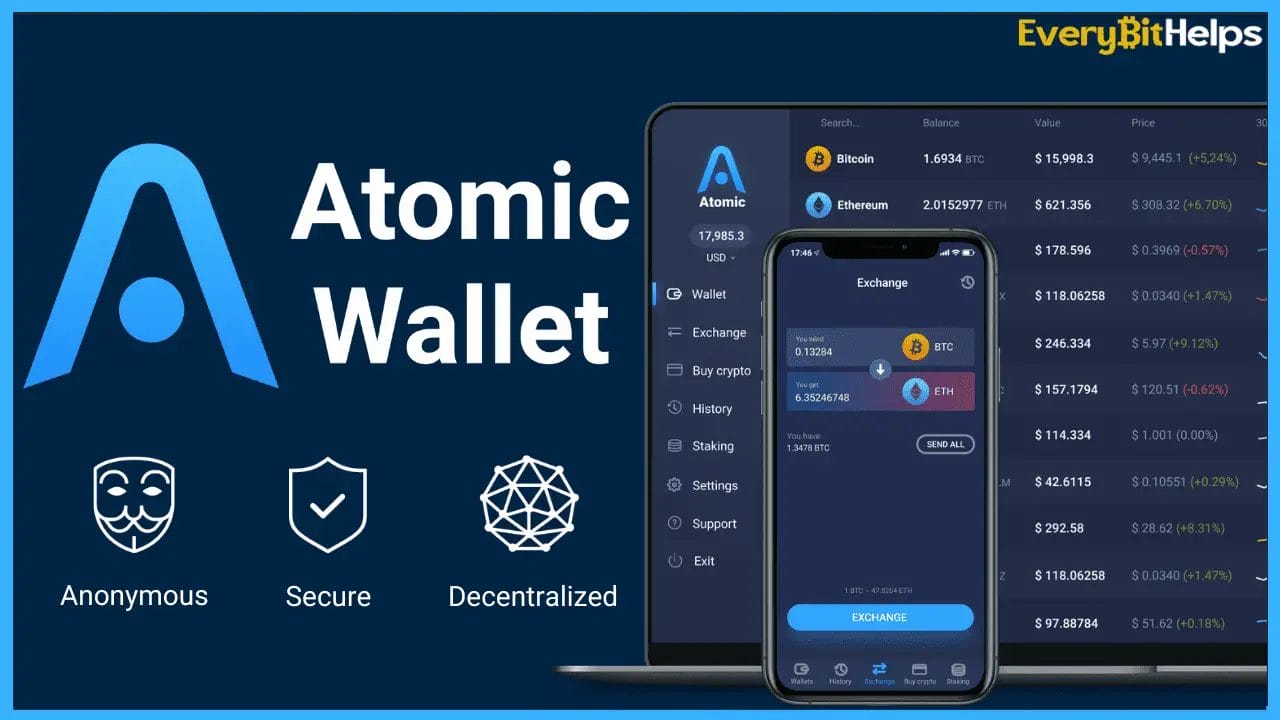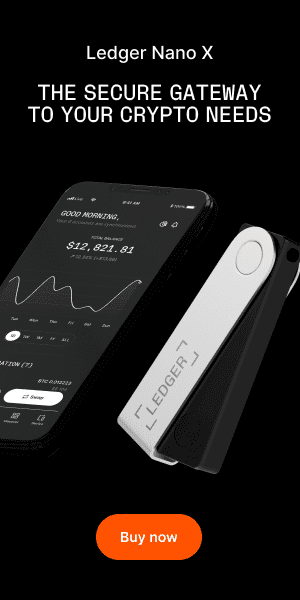In this in-depth Atomic Wallet review, we’ll explore the popular crypto wallet’s features, security measures, fees, and unique offerings.
Whether you’re a seasoned crypto enthusiast or a beginner stepping into the digital currency space, this review will provide valuable insights into how Atomic Wallet can cater to your crypto management needs. From its built-in exchange to staking opportunities and a rewarding cashback program, let’s delve into what makes Atomic Wallet a noteworthy contender in the crypto wallet landscape.
Atomic Wallet Review

What is Atomic Wallet?
Atomic Wallet is a decentralized software wallet created by Konstantin Gladych, CEO and co-founder of Changelly.com. This versatile wallet supports over 1,000 different cryptocurrencies, allowing users to easily buy, stake, swap, and exchange their digital assets.
As a non-custodial wallet, Atomic Wallet prioritizes user control and security. Users’ private keys are encrypted and securely stored on their devices, ensuring they have complete control over their digital assets. There’s no need for verification or adherence to KYC protocols to access the funds in the wallet, further emphasizing user privacy and autonomy.
One of the standout features of Atomic Wallet is its staking functionality. Users can stake various cryptocurrencies, including Ethereum (ETH) and Cardano (ADA), to earn rewards, thereby enhancing their digital asset portfolio.
Atomic Wallet is readily available for download free of charge. It’s compatible with a wide range of platforms, including mobile and desktop operating systems such as Windows, MacOS, Android, iOS, Debian, Ubuntu, and Fedora. This ensures that users can manage their digital assets conveniently, regardless of their preferred platform.
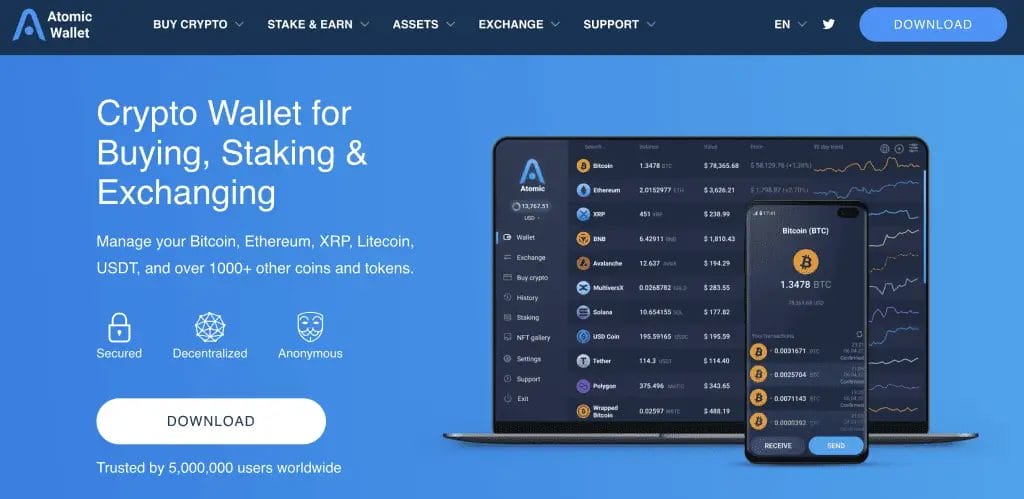
Features
As we delve into the world of Atomic Wallet, it’s essential to highlight its array of features that make it stand out in the crowded cryptocurrency wallet space. These features not only enhance the user experience but also provide a comprehensive suite of tools for managing and trading digital assets.
Let’s take a closer look at the key features that make Atomic Wallet a versatile and user-friendly platform for both beginners and seasoned crypto enthusiasts.
Staking
Atomic Wallet provides an opportunity for users to earn rewards by staking their cryptocurrency. Staking is a process in which users participate in a proof-of-stake (PoS) blockchain network by holding and “staking” their cryptocurrency in their Atomic Wallet. This process helps to secure the network, and in return, stakers receive rewards, often in the form of additional cryptocurrency.
The staking process in Atomic Wallet is designed to be user-friendly, making it accessible even for those new to the concept of staking. Users can currently stake 20+ crypto assets and earn up to 20% APY. It’s also important to note that while staking allows users to earn rewards, it may also involve certain risks, including the price volatility of the staked assets.
Atomic Wallet charges network fees for staking, which are fees paid to the miners who verify and add transactions to the blockchain. These fees can vary based on the transaction type and the network state.
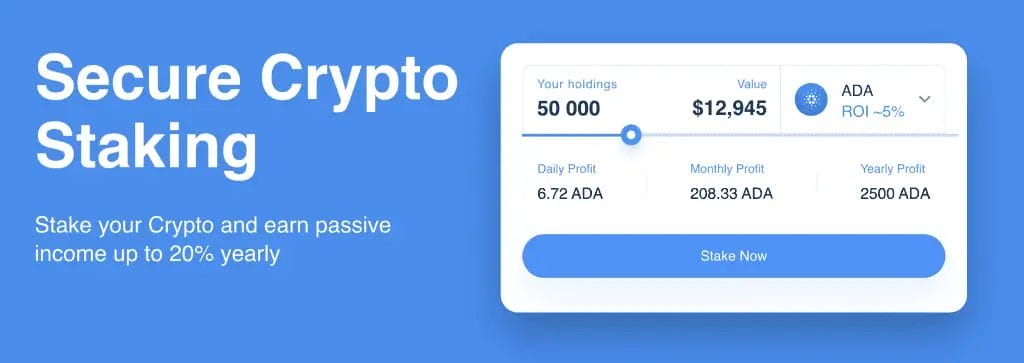
Buy Crypto
Atomic Wallet provides a straightforward process for buying Bitcoin and other cryptocurrencies. Buying crypto with Atomic Wallet is provided by third-party API providers, and there is a flat 2% fee ($10 min) for purchasing cryptocurrency with fiat currency (USD, EUR, etc.).
Please note that while you can sell Bitcoin within the wallet, it’s currently impossible to cash out from Atomic Wallet directly to your bank account. You’ll need to use other services to convert your crypto to fiat currency.
To buy crypto on Atomic Wallet, you will need to follow the below process;
- Install Atomic Wallet: First, you need to download and install Atomic Wallet on your device.
- Verify Your Identity: To prevent fraud and ensure it’s really you making the transactions, you’ll need to verify your identity. This process typically involves providing a photo ID.
- Purchase Cryptocurrency: Once your identity is verified, you can buy cryptocurrency with a Credit/Debit card. You can start with as little as $50 and up to $20,000 daily. The purchased cryptocurrency will be received in your Atomic Wallet.

Exchange
Atomic Wallet provides a built-in exchange that allows users to swap, exchange, or convert crypto assets directly within the wallet. This feature is powered by a third-party API and charges a 0.5% fee for this service. The exchange rates can fluctuate based on market conditions, so the final amount you receive might differ slightly from the estimated amount.
Although the exchange fee is high compared to crypto exchanges like Binance or OKX, it makes exchanging crypto convenient, as users do not need to transfer their assets to an external exchange.
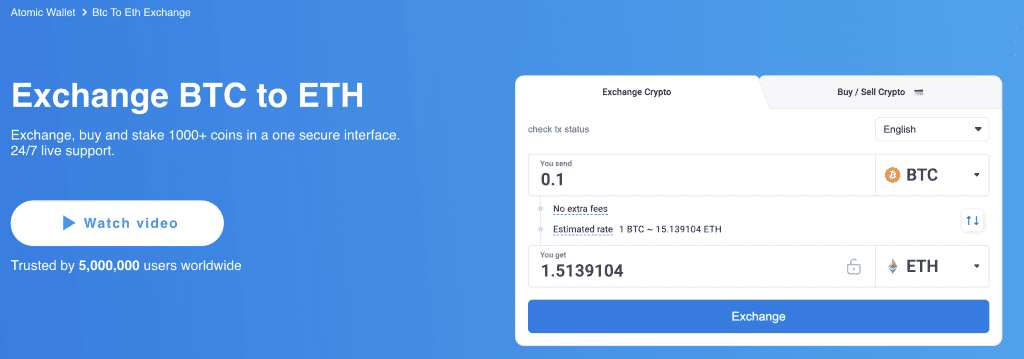
Cashback
Atomic Wallet offers a cashback program that rewards users for using its built-in exchange. Users can earn up to 1% cashback for each exchange or purchase made within the app. The cashback is received in AWC (Atomic Wallet Coin), which is distributed monthly.
The tiered cashback program has four levels: Blue, Silver, Gold, and Platinum. Each level requires a different amount of AWC to be held in the wallet and offers different cashback rates and maximum monthly cashback amounts:
- Blue (Free): Offers 0.25% cashback with a maximum of $50 monthly.
- Silver (300 AWC): Offers 0.5% cashback with a maximum of $100 monthly.
- Gold (600 AWC): Offers 0.75% cashback with a maximum of $200 monthly.
- Platinum (1000 AWC): Offers 1% cashback with a maximum of $400 monthly.
In addition to the cashback program, users can also earn an additional 20% reward for staked coins if they hold AWC.
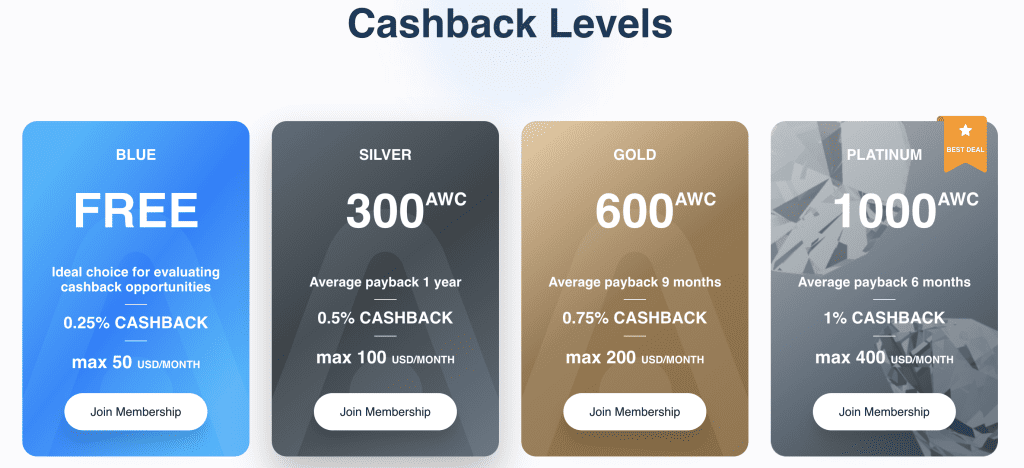
Security
Atomic Wallet is known for its robust security measures designed to give users full control and custody of their digital assets. As a non-custodial wallet, it allows users to manage their private keys, which are encrypted and stored on their devices. This means the users, not the wallet provider, have complete control over their funds.
To ensure the safety of transactions, Atomic Wallet requires users to input their passwords. This additional security layer helps prevent unauthorized access to the wallet and its contents.
When setting up the Atomic Wallet for the first time, users are provided with a 12-word backup seed phrase. This phrase is randomly generated and serves as a recovery tool if users lose access to their wallet. It’s crucial for users to store this seed phrase securely, as it’s the only way to recover their accounts.
Atomic Wallet Hack
Despite its strong security measures, Atomic Wallet experienced a significant security breach in June 2023. Hackers associated with the notorious North Korean Lazarus group managed to steal over $35 million worth of various cryptocurrencies from users’ wallets. The stolen funds were then laundered through Sinbad.io, a coin-mixing service. This incident underscores the importance of continuous vigilance and the implementation of advanced security measures in the world of digital assets.
Support
Atomic Wallet provides customer support through its 24/7 live support, ensuring users can get quick and efficient responses to their queries or issues at any time. For users who prefer self-help options, Atomic Wallet has a comprehensive Help Center filled with articles and guides that cover a wide range of topics, from using the wallet to buying and exchanging cryptocurrencies and staking.
For more complex issues or inquiries, users can directly reach out to Atomic Wallet’s support team via email at support@atomicwallet.io. Additionally, Atomic Wallet maintains an active presence on various social media platforms, including Twitter, where they share updates and news and respond to user queries.
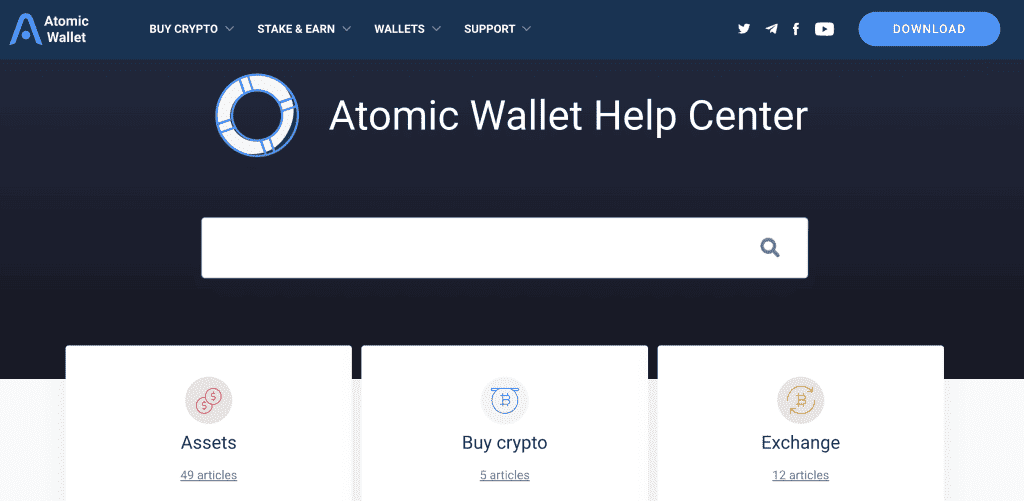
Fees
While downloading and using Atomic Wallet is free, users are required to pay certain fees for transactions. These include network fees for sending, staking, and converting crypto, which goes to the crypto miners who verify and add transactions to the blockchain. The network fees can vary based on the transaction type and the network state.
When buying crypto in the wallet using a bank card, transactions are facilitated by a third-party partner, Simplex, which charges a flat fee of 2% and a maximum of $10 per transaction. Atomic Wallet also charges an exchange fee of 0.5% for using its built-in exchange feature. These fees are important to consider when calculating the cost of transactions within the wallet.
Atomic Wallet vs Exodus Wallet
Exodus Wallet is another popular cryptocurrency wallet that is often compared to Atomic Wallet. It also offers a multichain Web3 wallet that connects to multiple networks, including Ethereum, Solana, and BSC. This allows users to access DeFi apps, buy NFTs, and explore Web3 without leaving their browsers.
Exodus Wallet is available on both desktop and mobile platforms, including Android and iOS, and it allows users to manage multiple portfolios, stake and buy crypto, view their NFTs, and explore Web3. It also offers a built-in swap feature and a Rewards app to grow your crypto portfolio.
Exodus Wallet provides a hardware wallet solution in partnership with Trezor, offering enhanced security where assets stay securely offline on Trezor hardware.

Comparing Atomic Wallet and Exodus Wallet:
- Supported Cryptocurrencies: Both wallets support a wide range of cryptocurrencies.
- Staking: Atomic and Exodus provides staking for various cryptocurrencies like Ethereum (ETH) and Cardano (ADA) with an APR ranging from 4% to 20%.
- Security: Both wallets are non-custodial, meaning users have full control over their private keys, which are stored on their devices.
- Buying Crypto: Users can buy cryptocurrencies with Atomic, and Exodus Wallet, which allows users to buy crypto using credit/debit cards.
- Web3 and DeFi: Exodus offers a multichain Web3 wallet that allows users to connect to multiple networks, including Ethereum, Solana, BSC, and access DeFi apps, buy NFTs, and explore Web3.
- Hardware Wallet: Another major benefit of Exodus Wallet is its partnership with Trezor which can enhance users’ security.
- Support: Both wallets offer robust customer support.
- Platform Availability: Exodus and Atomic wallets are available on multiple platforms and available on mobile for Android and iOS.
Conclusion
Atomic Wallet stands out as a versatile and user-friendly platform for managing and trading over 1000+ cryptocurrencies. Its robust security measures, including encryption of private keys and a 12-word backup seed phrase, provide users with full control over their funds. The wallet’s built-in exchange feature, the opportunity to earn through staking, and a cashback program make it a comprehensive solution for beginners and experienced crypto enthusiasts.
Despite a significant security breach in 2023, Atomic Wallet has maintained a strong reputation in the crypto community, making it a viable choice for those seeking a decentralized wallet.
FAQs
Is Atomic Wallet safe?
Atomic Wallet is generally considered safe and has implemented several security measures to protect users’ funds. As a non-custodial wallet, it allows users to have full control over their private keys, which are encrypted and stored on their devices. This means that the users, not the wallet provider, have complete control over their funds.
To further enhance security, Atomic Wallet requires users to input their passwords for any transactions. When setting up the wallet for the first time, users are provided with a 12-word backup seed phrase, which is crucial for account recovery in case of lost access.
How do I get my money out of my Atomic Wallet?
To withdraw money from your Atomic Wallet, you must send your cryptocurrency to an exchange that supports fiat withdrawals. Once the cryptocurrency is in the exchange, you can sell it for fiat currency (USD, GBP or EUR) and then withdraw it to your bank account. It’s important to note that Atomic Wallet itself does not currently support direct withdrawals to a bank account.
Is Atomic Wallet safer than Coinbase?
Both Atomic Wallet and Coinbase have robust security measures in place. Atomic Wallet is a decentralized wallet where you have full control over your private keys, which are stored on your device. This means you have full custody of your funds.
On the other hand, Coinbase is a centralized exchange that stores your private keys for you. While both have their advantages, the choice between the two often comes down to personal preference and whether you prefer having full control over your keys (Atomic Wallet) or having the exchange manage them (Coinbase).
Is Atomic Wallet a US company?
Atomic Wallet is a global company with a decentralized team working from various parts of the world. While it serves users worldwide, including US users, it’s not specifically a US-based company.
How anonymous is Atomic Wallet?
Atomic Wallet does not require any personal information to create a wallet, and it does not store any user data. All your private keys are stored on your device, and transactions are completely anonymous. However, when buying crypto with a bank card, a third-party service is used, which may require identity verification.

